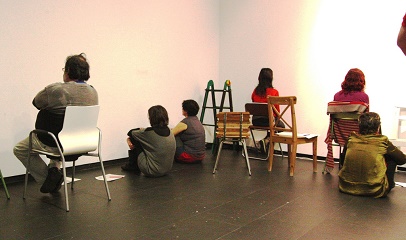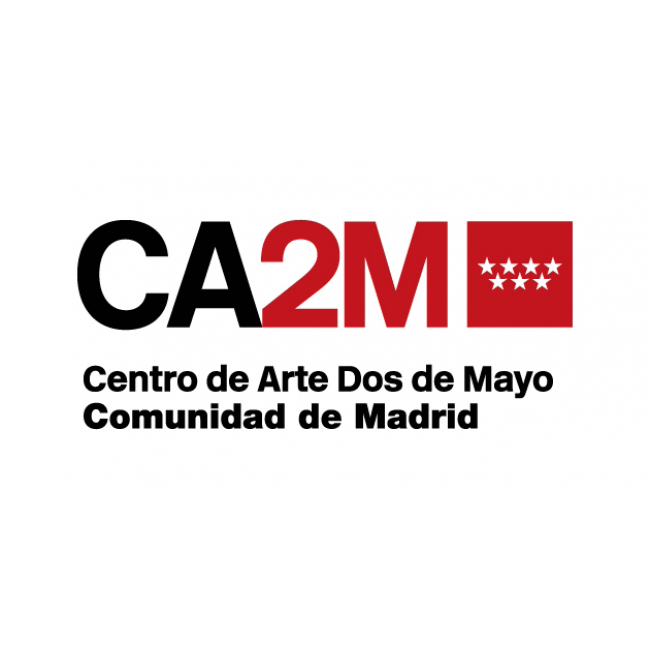THU 9 JUN 2010. 19:00 H. SHARING COUNTER - EDUCATIVE MATERIAL & PROJECTS
In this session we will examine materials and strategies used inside and outside of the classroom.
27 & 28 MAY 2010. 10:30 – 14:00 H. WHAT CAN WE DO? EDUCATION AS AN ACTION AND MOTIVATION. SEMINAR WITH MARINA GARCÉS, SANTIAGO LÓPEZ PETIT, DIEGO SZTULWARK AND VERÓNICA GAGO FROM COLECTIVO SITUACIONES
In this session, we will work on texts written by our guests so as to lead the discussion as a critical workshop in which these ideas are related to our own educative experiences. The texts deal will very important concepts, worthy of an in-depth study such as the construction of community, learning process and affects, citizenship, thoughts as an act of resistance…These texts allow us to think and they encourage a collective reflection on emotions, conflicts and uneasiness as well as the necessity of constructing a new kind of autonomy intertwined with other subjects, rather than with individuality. This workshop is the continuation of one of the main line of works of las lindes consisting of a reflection on education from different perspectives and experiences.
MARINA GARCÉS (Barcelona, 1973) is a lecturer in Philosophy at the University of Zaragoza. She is author of Las prisiones de lo posible (Ed.Bellaterra, 2002) and is regularly published in magazines such as Archipiélago, Zehar, Daimon, etc. She has also participated in collective publications: Por una política nocturna (Debate, 2002), the report Barcelona 2004, el fascismo postmoderno (Ed. Bellaterra, 2004), Las luchas autónomas en el Estado Español, 1970-1977 (Traficantes de sueños, 2008) or La humillación. Técnicas y discursos para la exclusión social (Ed. Bellaterra, 2009) and El arte en cuestión (Valencia, 2010), etc. In 2003, she started Espai en Blanc (www.espaienblanc.net), a joint initiative dedicated to collective experimentation with thoughts. In the frame of this project, she coordinates the magazine Espai en Blanc. Materiales para la subversión de la vida (Ed.Bellaterra) and participates in different research projects. She is currently actively involved in the Master in contemporary performative arts (Institut del Teatre de Barcelona) and other research processes. www.marinagarces.com
DIEGO SZTULWARK Y VERÓNICA GAGO DE COLECTIVO SITUACIONES
Colectivo situaciones defines itself as a Buenos Aires-based militant research collective. Militant research is an elaboration of thoughts in contact with social experience. This practice intends to contribute to self-representation of society through a constant, flexible and equal work with all parties to the conflict. They set up the independent publishing company "Tinta Limón". They were already involved with some of the most active social movements and initiatives before the 2001 popular uprising: Movimiento de Trabajadores Desocupados (unemployed workers’ movement), Escuelas Libres (free schools), Trabajadoras del Sexo (sex workers), Trabajadores precarios del telemarketing (precarious telemarketing workers), GAC (Street Art Group), H.I.J.O.S. (organization of the children of the disappeared during the dictatorship) etc. They also participated in educative experiences such as the school "Creciendo Juntos" or "Universidad Trashumante". In our lindes session of December 2010 we discussed fragments of Un elefante en la escuela, http://blip.tv/file/4600758 (from 26.15 on).
Diego Sztulwark and Verónica Gago are holding a residency in Madrid as they are supported by the programme for researchers, El Ranchito (Matadero Madrid).
Activist of Workers’ Autonomy during the 1970’s, SANTIAGO LÓPEZ PETIT (Barcelona 1950) worked as a chemist in a firm which was taken over by its workers. He was involved in resistance movements that followed the crisis of the Workers’ Movement. He currently works as a lecturer in Philosophy at the University of Barcelona. He participated in the project Espai en Blanc since the very beginning (www.espaienblanc.net). Among his books: Entre el Ser y el Poder. Una apuesta por el querer vivir (Ed. Siglo XXI, Madrid 1994); Horror Vacui. La Travesía de la Noche del Siglo (Ed. Siglo XXI, Madrid 1996), El infinito y la nada. El querer vivir como desafío (Ed. Bellaterra, Barcelona 2003), Amar y pensar. El odio del querer vivir (Ed. Bellaterra, Barcelona 2005), La movilización global. Breve tratado para atacar la realidad (Traficantes de sueños, 2009). He has likewise contributed to a number of collective books and has been published in journals including El Viejo Topo, Archipiélago, Riff Raff, Futur Antérieur and Posse. His main working line is the relationship between life, politics and art from a critical and activist perspective.
Download reading folder
14 APR 2011. 19:00 H. READING ANALYSIS VI. HE THAT HAS LITLLE AND WANTS LESS IS RICHER THA HE THAT HAS MUCH AND WANTS MORE
In this session, we will discuss education related to public or private fields, as well as advertising and mass media as a factory of consensus and its role in the construction of hedonism.
Chapter “Construction the Romantic Utopia” in Illouz, Eva, Consuming the Romantic Utopia: Love and the Cultural Contradictions of Capitalism, Berkeley, 1997.
"On Democarcy and Education" pp. 294-295 Noam Chomsky
And the following videos:
http://www.youtube.com/watch?v=zvd9NeW6zfc
http://www.youtube.com/watch?v=gPTC4XlYm2s
10 MAR 2011. 19:00 H. BUT PROF, WHAT'S THAN ALL ABOUT? 2ND INTRODUCTORY SESSION
Double session on unbiased educational material, experimental practices and other liberating entertainment. This session is the continuation of last February gathering. We invite all of you to bring materials and strategies that you may have used in your educative practice and that you'd like to share, discuss and experiment in Las Lindes.
10 MAR 2011. 19:00 H. BUT PROF, WHAT'S THAN ALL ABOUT? 1ST INTRODUCTORY SESSION
Double session on unbiased educational material, experimental practices and other liberating entertainment. During this session, teaching resources and strategies used by participants were presented in their educative contexts: a session in which objects, ideas have been brought up so that they can be shared with all participants.
13 ENE 2011. 19:00 H. RETHINKING LAS LINDES 2011
In this session, we discussed topics related to practical issues of las lindes and we reflected on this year's project and its development until now.
9 DIC 2010. 19:00 H. READING ANALYSIS V
In this session, we will analyse some of the aspects put forward by various authors in different contexts. Nevertheless, they all conceive education as a utopian project.
Ferrer y Guardia, La Escuela Moderna, Barcelona, 1912. Chapter dedicated to the education of the future
José Val del Omar "Sentimiento de la Pedagogía. Kinestésica", June 1932.
Francisco José Cuevas Noa, Anarquismo y Educación, Madrid, 2003. Chapters dedicated to Paideia School (Merida) and unschooling:objections to conventional education.
Colectivo Situaciones, Un elefante en la escuela, Buenos Aires, 2008. Chapters "Hacer escuela, estar en banda" and "¿qué puede una escuela?"
11 NOV 2010, 19:00 H.
Se crearon dos grupos en los que se compartieron las observaciones realizadas en las actividades educativas individuales desde la última sesión. Tras esto se hizo una puesta en común de las conclusiones de los dos grupos de trabajo.
Uno de los grupos expuso que las observaciones que se habían fijado en la sesión anterior les habían dado mucho que pensar, y se propuso continuar el trabajo de observación intentando sistematizarlo y experimentar con ello. Se propuso la posibilidad de observar nuestros prejuicios, los que tenemos desde hace tiempo y los que se van generando en relación a grupos con los que trabajamos un poco más a largo plazo… Por último se habló sobre estrategias relacionadas con los silencios vinculados al género. El otro grupo estuvo hablando de sus experiencias personales y no expusieron conclusiones al grupo general.
14 OCT 2010, 19:00 H.
Si en el curso anterior de Las lindes se había intentado reflexionar en torno a unos textos para facilitar el lenguaje en torno a unos referentes comunes, el propósito de este segundo año se define como un intento de bajar desde la teoría hasta la práctica.
Para dar este paso se decidió dividir al grupo en tres partes, para operativizar las sesiones de trabajo, generar lenguaje común y analizar lo propio a través de lo ajeno y a la vez, nutrir la práctica educativa a partir de nuestras experiencias.
Tras la división en grupos, se pusieron en común las propuestas de observación:
- Los silencios y las dinámicas que puede generar cuando el alumno no responde al diálogo
- El miedo, desde el punto de vista del miedo a la libertad, cómo reaccionamos ante los proyectos libres o que no nos marcan líneas claras de actuación
- Dinámica espacial y relaciones corporales. Analizar el lugar del cuerpo en el espacio, tanto el del profesor y como los de los alumnos y como se distribuye el espacio en el aula.
- La dirección de las preguntas que se hacen, que intención tenemos con cada pregunta
- Relación entre la toma de la voz y el diálogo con las situaciones de igualdad/desigualdad.
Documentation and further information
ALL VIDEOS
Educational Programme 2010 - 2011

